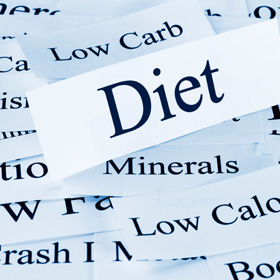Low-carb vs. low-fat and other things to remember when dieting
January 12, 2015

Limiting carbohydrates in your diet can help your heart, but let’s not go overboard. Some people think that as long as they’re on a low-carb diet, they can eat burgers and butter all day—that’s a problem.
It’s not that simple.
The truth is, a healthy diet is a balanced diet. If you are going to cut carbs or fat, you’re probably going to replace it with something. With dieting, one of the most important questions is: When you reduce something in your diet, what are you replacing it with?
A September 2014 study published in the Annals of Internal Medicine compared low-carb and low-fat diets. Half of the people in the study followed a low-carb diet, and the other half followed a low-fat diet. Overall, the people on the low-carb diet made more improvement in their health. But a few caveats are important to note:
The study did not determine if the low-carb diet lowers the risk of a heart attack or stroke.
In a previous study, participants cut carbohydrates from their diet but replaced them with foods higher in saturated fat. As expected, their cholesterol levels went up, especially the “bad” (LDL) cholesterol.
Remember, if you limit carbohydrates, what are you replacing them with makes all the difference.
- The participants who reduced their carbohydrates added more protein, monounsaturated fats, and polyunsaturated fats to their diets. In other words, they replaced carbs (such as breads, cereals, and pasta) with reasonable foods, not unhealthy ones.
- Overall, the people on the low-carb diet improved their cholesterol levels slightly. The levels of “bad” (LDL) cholesterol did not change, but the levels of the “good” (HDL) cholesterol went up.
Is it magic?
In reality, the reduction of carbohydrates isn’t specifically why the participants in the study lost weight. Along with reducing carbs, the participants also reduced their calories. Over the first six months of the 2014 study, participants on the low-carb diet consumed an average of 150 calories per day less than people on the low-fat diet.
There’s nothing magical about reducing the amount of carbohydrates. To lose weight, it’s the calories that matter most.
However, it is true that by eating more protein and good fats you can feel less hungry and eat less. This may be an important bonus of the low-carb diet.
The million-dollar question is: If a low-carb dieter and a low-fat dieter had exactly the same caloric intake over a period of time, who would lose more weight? That’s something we don’t know right now.
My advice for dieters
When I see a patient who is interested in dieting, my first question is: What are you trying to accomplish? Some are just trying to lose weight, while others want to improve their cholesterol levels or lower their risk for heart disease.
Ideally, the answer will be all of those things, but sometimes it’s better to focus on one at a time. The plan we recommend depends on the desired outcome.
If you want to reduce your risk of heart attack or stroke, neither the low-carb nor low-fat diet has been proven to do that. The Mediterranean Diet, however, has been shown to lower heart attack and stroke risk by 30 percent. In some ways, this diet is a mixture of the low-fat and low-carb diets. It includes more fruits, vegetables, and whole grains. Other prominent components include olive oil and nuts, especially walnuts and almonds.
Overall – whether it’s low-carb, low-fat, or Mediterranean – my best advice is to be prudent with your food choices. It’s almost always a good idea to eat more fruits and vegetables, too.











